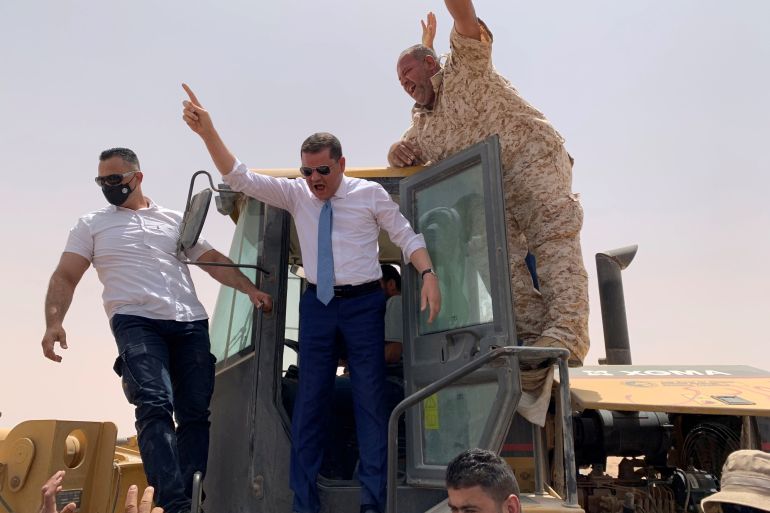Libya PM says key coastal road reopened ahead of peace talks
Abdul Hamid Dbeibeh declares the east-west highway open, but eastern forces are still blocking it on their side.

The head of Libya’s unity government said he has reopened the main coastal road across the frozen front line, a gesture of progress in the fragile peace process, but eastern forces said the road remained closed.
Prime Minister Abdul Hamid Dbeibeh’s move on Sunday to reopen the road is in line with a ceasefire deal agreed last year as part of efforts to resolve Libya’s decade of chaos and violence.
Keep reading
list of 4 itemsLibya: Military movements banned after Haftar’s border takeover
Germany, UN to host Libya conference
Will Libya commander Haftar run in December’s election?
Dbeibeh said on Sunday that reopening the coastal road connecting Misrata in western Libya and the Mediterranean city of Sirte marks a “new step” towards re-establishing stability and unity in the North African country.
“I am so delighted to participate in the opening of this essential lifeline linking the east of our country to its west,” Dbeibeh told a crowd that gathered as bulldozers were towing away rocks and sand dunes blocking the road.
The move comes days before international powers meet in Berlin to discuss the Libya crisis and progress towards unifying the country’s fragmented institutions and holding elections planned for December.
Dbeibeh removed a mound of sand blocking the road at the final checkpoint on the western side of the front line, before driving eastwards with his convoy towards Sirte, held by eastern forces.
However, a media unit of rebel commander Khalifa Haftar’s eastern-based Libyan National Army (LNA) said the road was still closed and there was “no truth to what is rumoured about it reopening”.
Al Jazeera’s Malik Traina, reporting from the coastal road near Sirte, said that eastern forces say the full opening of the road would require approval from the joint military commission representing both western and eastern forces.
“It just goes to show that Libya is still deeply divided. I think many people were hopeful that this interim government would unify the country but we are going to have to wait and see what’s going to happen,” he said.
Libya, a major North African oil producer, has had little peace or stability since the NATO-backed rising against Muammar Gaddafi in 2011 and a split in 2014 between warring eastern and western factions.
Haftar’s forces
Though the reopening of the road would mark a significant step for the internationally supported peace process, big challenges remain with armed power still held by myriad groups including the forces of eastern commander Haftar.
Earlier on Sunday, in a move that underscored his continued military clout, Haftar’s forces announced they had closed the border with Algeria after deploying heavily in the south.
The reopening of the coastal highway and other terms of the ceasefire, agreed in September after the collapse of Haftar’s 14-month offensive on Tripoli, were meant to be implemented months ago.

However, while flights have resumed between Tripoli and the eastern city of Benghazi, and some prisoners have been freed, the road remained blocked at the front line.
Western Libyan forces had refused to open it until another ceasefire condition – the removal of powerful foreign mercenaries entrenched around front lines – was carried out.
The ceasefire and the formation of Dbeibeh’s Government of National Unity (GNU) were both agreed through a talks process facilitated by the United Nations and backed by the international community.
The process is intended to result in elections, but neither the UN talks participants nor the divided, eastern-based parliament have agreed on a constitutional basis for the vote to go ahead, opening potential challenges to its legitimacy.